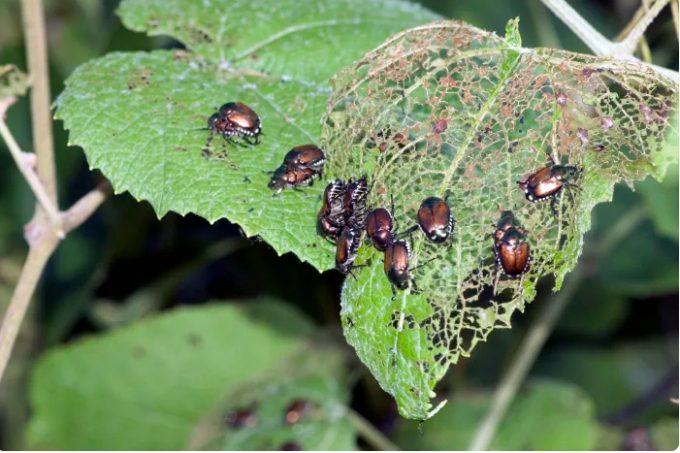November 21, 2025 | 07:36 GMT +7
November 21, 2025 | 07:36 GMT +7
Hotline: 0913.378.918
November 21, 2025 | 07:36 GMT +7
Hotline: 0913.378.918

Japanese beetle eat trees in Illinois. Photo: NYT
The 4-6-week period of intense activity by the gleaming, copper-colored adult Popillia japonica is underway.
These beetles may seem to have it in specifically for your roses, raspberries, crab apples or grapes, but those are just a few of the 300-plus plant species they are known to feed on in North America.
The expert advice might sound counterintuitive: Stop trapping them. (Farewell, beetle bags, despite the marketing promises.) And maybe hold back on watering lawns in the July heat, as female beetles will be seeking a moist spot to lay eggs.
Yes, those are steps toward making peace with this here-to-stay invasive pest, which scientists have sought to subdue since shortly after it was identified in New Jersey in 1916.
Nearly a century later, a 2015 U.S. Department of Agriculture homeowners’ guide to Japanese beetle management put the cost of control in the United States — including the removal and replacement of damaged turf — at $460 million annually. Half of that damage is caused not by the adults, but during the beetles’ larval stage, by the grubs.
Still, this is a troublemaker at both stages of life — and its wide-ranging diet doesn’t hurt its chances, either.
Based on decades of tracking the beetles’ seemingly inexorable march westward in North America, Daniel A. Potter, a professor in the department of entomology at University of Kentucky, described the arc: “The first few decades in a new area, the insect goes crazy and builds to high levels before the population starts to stabilize. Then it goes from a plague to a nuisance.”
For those of us at the nuisance phase, here are some suggestions. But first, some background on the strategies behind the Japanese beetle’s sustained invasion.
(The New York Times)

(VAN) Amid vast floodwaters, the spirit of sharing and helping others shown by many people in Gia Lai reached tens of thousands of residents stranded by raging floods.

(VAN) Climate change is set to emerge as a key focus of collaboration within the framework of the Comprehensive Strategic Partnership between Viet Nam and New Zealand.

(VAN) Future veterinarians will be the ones directly deciding how antibiotics are prescribed, administered, guided and managed across thousands of farms nationwide.

(VAN) Argentine Ambassador Marcos Antonio Bednarski says Viet Nam is playing an increasingly influential role in Argentina’s economic and technical engagement in Southeast Asia, as Buenos Aires is seeking long-term partners.

(VAN) Prime Minister requested local authorities to use all available measures to reach residential areas that are deeply flooded, cut off, isolated, or affected by landslides.

(VAN) To confront historic flood surge on Ba and Kon rivers, the Prime Minister requested local authorities to mobilize all available forces, evacuate residents, and ensure reservoirs and dams safety.

(VAN) The United Kingdom (UK) has offered to assist Vietnam in accessing significant financial resources to drive agricultural innovation while simultaneously expanding the market for forest-based carbon credits.